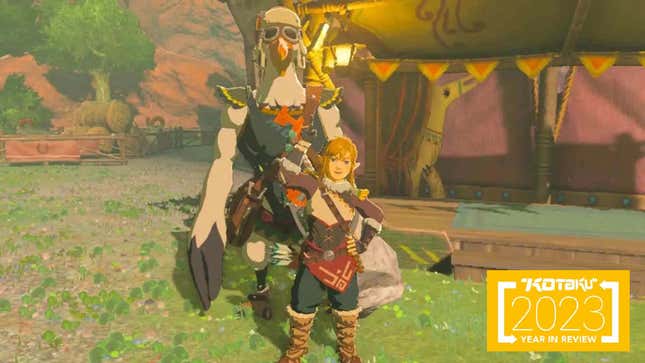
I love the idea of annual top 10 lists until it comes time to actually make one. Then my perpetually indecisive brain freaks out about whether the game I spent 100 hours playing was actually any good, the tension between an interesting game and a fun one, and the cries of all the games I never finished or even got around to starting, still begging for my attention.
I spent 2023 tracking some of the best new games that came out every month, attempting to at least try as many of them as I could while also measuring how my feelings changed about them as the year went on. And I ended up playing a bunch of them while still not getting around to what no doubt would have been strong personal GOTY contenders.
With a not-so-short short list assembled by early December, the task then becomes figuring out which games I actually thought were the best. I’ve worked hard to convince myself over the years that the process is more art than science. Inevitably I tally up the perceived merits and flaws of a game and then try to compare the vague calculations, an exercise that always ends in a mix of conflicted self-doubt and second-guessing.
Eventually I silence the internal dissent and retreat into a more abstract sense of what feels right. Recently this has meant giving in more to my personal tastes and subjectivity, championing the games I love rather than the ones I feel I ought to like, and praising them for the one or two things they do very well instead of letting all the smaller things they don’t do so well hold them back. This doesn’t impose any more order on the chaos of comparing a roguelite loot shooter to a visual novel adventure, but it does give me fewer pangs of guilt when I eventually settle on rating one above the other.
Here, in alphabetical order, are the top 10 games that moved me the most in 2023.
Armored Core VI: Fires of Rubicon
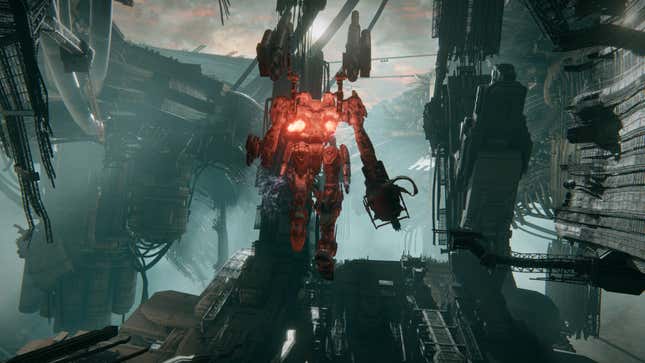
I’ve always understood and appreciated the Soulsborne formula and its many flavors on an intellectual level, but Armored Core VI was the game that finally made me feel and love the initial hopelessness and eventual satisfaction that comes from mastering a FromSoftware game. The mech shooter is razor sharp and ultra polished when it comes to zipping around environments and engaging in moment-to-moment combat. You actually feel yourself becoming more in-sync with the custom robot’s strengths and limitations the more you play, each successive boss fight pushing you to come to a deeper understanding of what’s important and what’s just noise. I spent several nights trying to beat Balteus. I don’t regret any of them. And I remain blown away by Armored Core VI’s vibes-based storytelling and branching new game plus mode. Its economical arcade design rewards you for every additional minute you put into it and doesn’t waste time on anything superfluous.
Baldur’s Gate 3
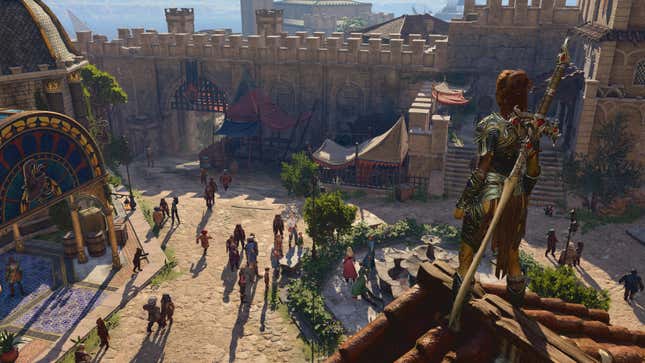
Sometimes superfluous is good, though. In fact, sometimes it can be transcendent. The promise of a dozen roads not taken in a video game pays off in making the one you did walk feel unique, unlikely, and unmistakably yours. I love that Baldur’s Gate 3 contains entire games’ worth of conversations, interactions, and outcomes I will never experience. It makes the small journey I have been on feel that much more intimate and personal. None of this would matter, of course, if Baldur’s Gate 3 was not well written, painstakingly choreographed, and expertly voice acted. It’s a dense RPG full of gear and skills to manage alongside quests and boss fights to navigate, and all of it, no matter how it plays out, feels like it was meant to happen that way. It’s the new gold standard for role-playing video games.
Chants of Sennaar
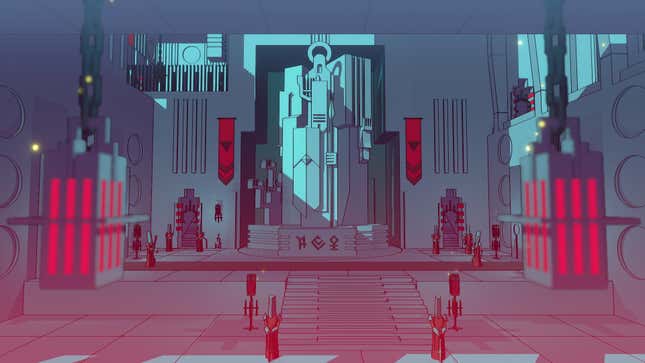
I don’t normally like language-based games. (Ironic considering I’m a writer.) I despise crossword puzzles. The inherent fluidity and ambiguousness of language mashed up with the rigid constraints of a game almost always leave me feeling underwhelmed and frustrated. I was shocked, then, to find out just how much I enjoyed Chants of Sennaar, a puzzle adventure about deciphering unknown languages between various factions in a Tower of Babel that oozes highly saturated yellows, blues, and reds. What I appreciated most was how quickly context and intuition helped whittle down possible solutions to problems, making limited communication gratifyingly achievable even when there was no foundation to begin building on. Rather than punish you for the shifty and slippery nature of language, Chants of Sennaar allows those elements to color your overall experience and interpretation of the game without blocking your moment-to-moment progress.
Cocoon
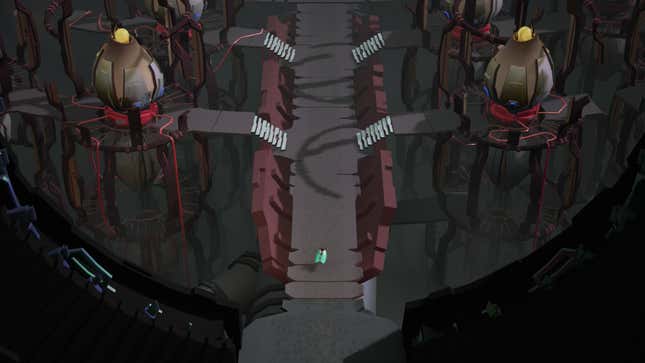
Cocoon feels like it was chiseled from a rock over thousands of years. Everything unessential has been methodically removed. All that’s left is a seamless sequence of puzzles gently nudging you toward new discoveries and brain-twisting realizations. Remnants of conventional game design like screen icons and boss fight deaths have been elegantly eradicated. Evocative musical queues punctuate each new milestone on your journey. And the rules governing its world are supremely simple but always manage to combine into solutions that feel just outside the realm of possibility. Cocoon is probably one of the best puzzle adventures ever made.
Cyberpunk 2077: Phantom Liberty
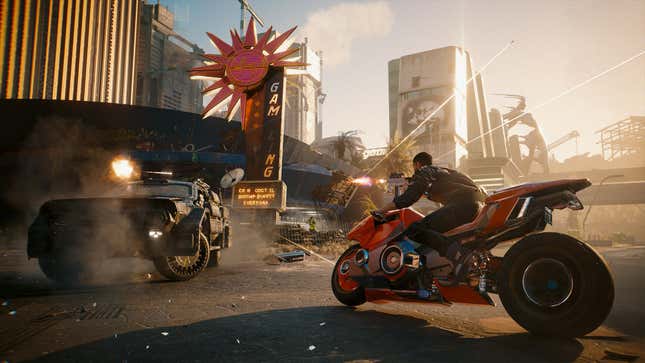
I finished Cyberpunk 2077 for the first time last year. Despite some fantastic missions and an overwhelmingly intricate open world, it left little impression on me. That seemed a symptom of the underlying structure of the game rather than anything that could be patched out with new abilities or a more impressive sci-fi open world simulation. Night City felt fundamentally alienating to me, and none of the individual characters, story arcs, or RPG progressions managed to pull me out of that feeling of malaise. That is, until Phantom Liberty and the game’s 2.0 update in 2023. The culmination of every new addition, from takedown animations and parrying bullets with katanas to jacked-up car chases and an entire subway system, is an open-world RPG that passes some imaginary threshold from feeling static and paper-thin to one that’s lively and responsive. It helps that Phantom Liberty is a streamlined campaign in a specific part of the map that, dispensing with the MacGuffins of the main plot, can instead weave an interesting and nuanced tale of political intrigue, betrayal, and necessary consequences. Taken together, it’s the game I was hoping Cyberpunk 2077 could be ever since I finished The Witcher 3's amazing Hearts of Stone and Blood and Wine expansions.
Darkest Dungeon II
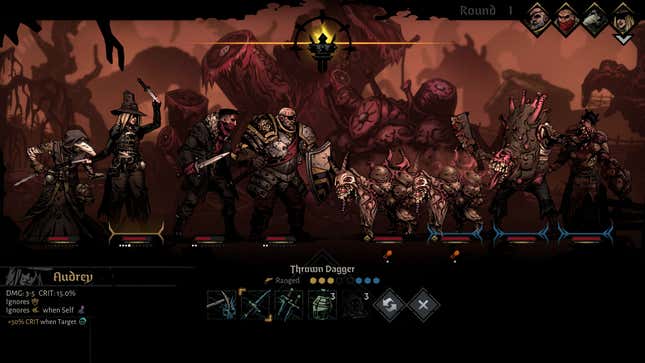
It only took one caravan ride in Red Hook Studios sequel to convince me it was something special. Darkest Dungeon II takes everything I loved about the first game and puts it in motion, propelling its brutal emergent storytelling and grim probability-based combat over all of the divots and ditches that occasionally ensnared its predecessor. Playing Darkest Dungeon II late at night with the lights turned off made me feel like I was racing through the gothic fall of humankind to save my soul. While it loses some of the managerial depth of the first game, it more than makes up for it with its more cinematic presentation and economical focus. I wish every game could create such an unmistakable sense of place, atmosphere, and engaging stakes with similar efficiency, and made failure feel so rewarding and profound.
Final Fantasy XVI
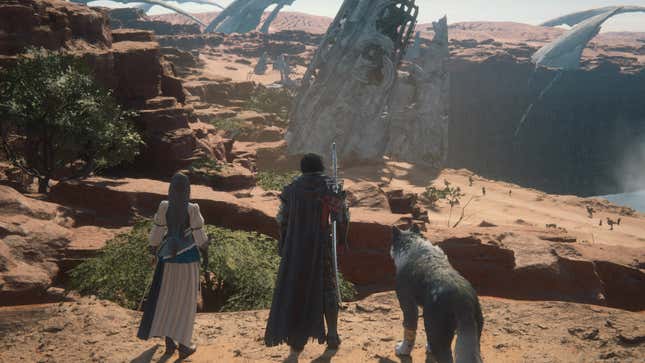
This is the problematic fave on this list. Final Fantasy XVI disappointed me in so many ways. From its shallow RPG systems to its dreary and cumbersome second half, the latest game in the Square Enix series felt like it left so much untapped potential on the table. It makes me dream of what the team might accomplish if given the time and resources to mount Cyberpunk 2077’s three-year turn around from Early Access to 2.0 victory lap. Instead of droning on about all the things I disliked about this game, I’ll simply say that it’s highs were higher than almost anything else I played this year and kept me coming back through a new game plus run which has reminded me why I love it, from the incredibly sleek and satisfying action to the magnificent cinematic boss fights. When the writing isn’t falling down flat on its face and the sky isn’t overcast with an impenetrable gloom, there is more than one flicker of the return to form Final Fantasy fans like me have been waiting more than a decade for.
Super Mario Bros. Wonder
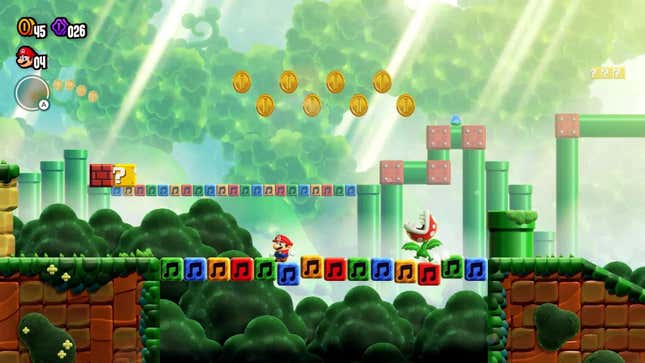
I almost left this one off the list. It feels like a cheating. Every stage in Super Mario Bros. Wonder is juiced to the max, carefully engineered to delight, entertain, and continually surprise you, all while maintaining the series’ tightly calibrated platforming feel and bespoke attention to detail. Super Mario Bros. Wonder doesn’t catapult the formula forward or feel as inventive as recent puzzle boxes like Super Mario 3D World and Bowser’s Fury. Its most remarkable moments don’t quite measure up to the peaks in Super Mario Bros. 3 or Super Mario World. But it’s exquisitely crafted, and every level is packed to the brim with new quirks and fun ideas. No game brought me more unburdened joy this year.
The Banished Vault
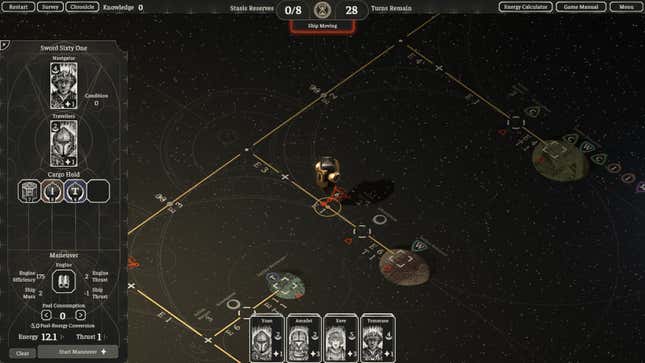
Obtuse, slow, and occasionally clumsy, The Banished Vault nevertheless takes spreadsheet navigation and adds an irresistible sense of existential dread to the proceedings. You play religious outcasts scavenging solar systems for resources to survive until the next cryo-sleep-induced hyper-light jump. The greatest terrors I felt in any game this year came from the prospect of miscalculating fuel reserves and how long I have until the next supernova. The Banished Vault can feel straightforward once you unravel its economy, but that process of demystification is complex and enthralling, and richly infused with meaning thanks to the austere presentation and haunting soundtrack. It made contemplating certain doom not just thrilling but spiritually soothing.
The Legend of Zelda: Tears of the Kingdom
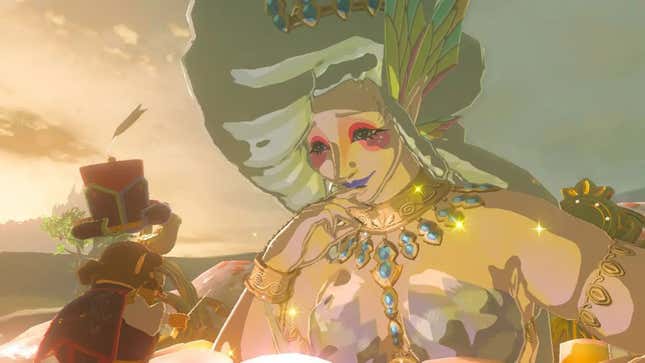
The Legend of Zelda: Tears of the Kingdom was a slam dunk. It surpassed my wildest expectations, taking what impressed me about Breath of the Wild and finding even more ways to surprise, delight, and gently lead me through its whimsical, dangerous, beautiful world. Game critics love to reward novelty, ambition, and bold experimentation. The nature of playing so many things and being exposed to so much naturally places a premium on the new and unexpected. Tears of the Kingdom has plenty of that, but more than anything it shows masters of their craft assessing, refining, and iterating on a formula they’ve spent decades on, like Chevy working on a new Corvette or Porsche making the latest 911. I’m still stunned that there’s a Zelda game where you can make your own rocket ship and somehow it doesn’t feel like a gimmick but rather like the most obvious and natural thing you could do in an open world fantasy adventure.
Honorable mentions: Season: A Letter to the Future, Humanity, Jusant, Planet of Lana, Saltsea Chronicles, Shadow Gambit: The Cursed Crew.
Needed more time with: Alan Wake 2, Star Wars Jedi: Survivor, Remnant II, Lies of P, Laika: Aged Through Blood, Dredge.
Didn’t get to: Terra Nil, Against the Storm, Fading Afternoon, A Space for the Unbound, Bomb Rush Cyberfunk, The Talos Principle 2, Slay the Princess, Void Stranger, and many more.
Liked but didn’t love: Spider-Man 2, Starfield, Diablo IV, Sea of Stars, Hi-Fi Rush, Moonring, Thirsty Suitors.




